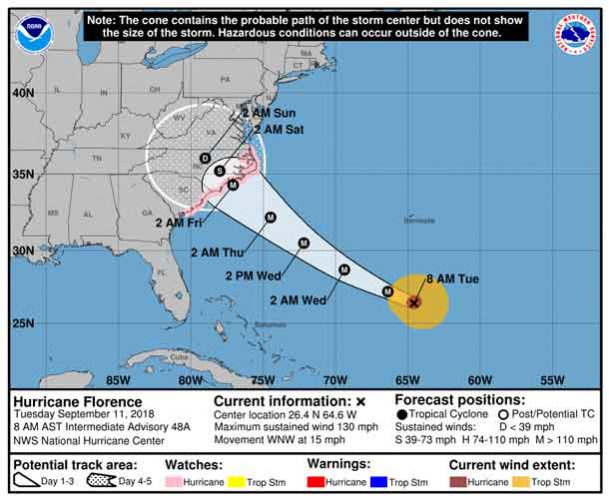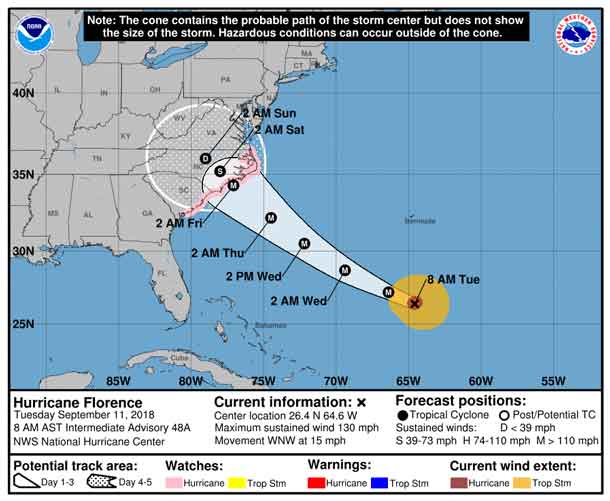 Authorities warn of life-threatening coastal storm surges and the potential for Florence to unleash prolonged torrential rains and widespread flooding
Authorities warn of life-threatening coastal storm surges and the potential for Florence to unleash prolonged torrential rains and widespread flooding
* Landfall in Carolinas forecast for Thursday
* Four governors declare states of emergency
* “We are in the bull’s eye” – North Carolina governor
* Inland flooding expected to be intense
By Anna Driver
HOLDEN BEACH, N.C., Sept 11 (Reuters) – More than 1.5 million people were ordered to evacuate their homes along the U.S. Atlantic coast as Hurricane Florence, a Category 4 storm and the most powerful to menace the Carolinas in nearly three decades, barreled in on Tuesday.
Florence, packing winds of 140 miles per hour (220 kph), was expected to grow even stronger before making landfall on Thursday, most likely in southeastern North Carolina near the South Carolina border, the National Hurricane Center in Miami said.
“We are in the bull’s eye,” North Carolina Governor Roy Cooper told reporters on Monday.
Florence was expected to turn into “an extremely dangerous major hurricane” during Thursday night, the hurricane center said in a bulletin.
Virginia Governor Ralph Northam issued an evacuation order for about 245,000 residents in flood-prone coastal areas beginning at 8 a.m. local time and South Carolina Governor Henry McMaster ordered more than 1 million residents along his state’s coastline to leave starting at noon on Tuesday.
At least 250,000 more people were due to be evacuated from the northern Outer Banks in North Carolina on Tuesday after more than 50,000 people were ordered on Monday to leave Hatteras and Ocracoke, the southernmost of the state’s barrier islands.
North Carolina, South Carolina, Virginia and Maryland governors have declared states of emergency.
Authorities warned of life-threatening coastal storm surges and the potential for Florence to unleash prolonged torrential rains and widespread flooding, especially if it lingers inland for several days.
NHC Director Ken Graham warned of “staggering” amounts of rainfall that may extend hundreds of miles inland and cause flash flooding across the mid-Atlantic region.
Forecasts expect 10 to 15 inches (25-38 cm) of rain in the hardest-hit areas, possibly more if the storm stalls over land, as expected, Graham said.
Mindful of devastation wrought by a string of deadly U.S. hurricanes last year, residents in the Carolinas began the rituals of disaster preparation – boarding up windows and stocking up on groceries, water and gasoline.
Classified as a Category 4 on the five-step Saffir-Simpson scale of hurricane strength, Florence was the most severe storm to threaten the U.S. mainland this year and the first of its magnitude to target the Carolinas since 1989, when Hurricane Hugo barreled over Charleston, South Carolina.
In Holden Beach, North Carolina, in the storm’s path, longtime residents were busy securing their homes and possessions.
“It’s scary to all of us. We know we can’t play around with this,” said Jennifer Oosterwyk, who owns the Sugar Britches boutique on Holden Beach and lives in nearby Wilmington.
(Reporting by Brendan O’Brien in Milwaukee Editing by Andrew Heavens)


